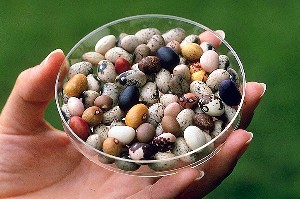10 December 2014. An analysis of research studies comparing organic to conventional farming shows conventional techniques have greater yields, but by a smaller margin than previously thought. The team led by environmental scientist Claire Kremen at University of California in Berkeley published its findings in today’s issue of the journal Proceedings of the Royal Society B (paid subscription required).
The UC-Berkeley team reviewed 115 studies with more than 1,000 observations comparing practices of organic and conventional growers, a number 3 times higher than previously published reviews of this kind, say the authors. “With global food needs predicted to greatly increase in the next 50 years” says Kremen in a university statement, “it’s critical to look more closely at organic farming, because aside from the environmental impacts of industrial agriculture, the ability of synthetic fertilizers to increase crop yields has been declining.”
The researchers used a new analytical framework, which they say better accounts for variability and structure of the data. With this change in approach, the team found conventional methods still had higher yields overall compared to organic techniques, but the 19 percent difference is smaller than reported in previous work.
In some cases the difference in yields between conventional and organic techniques were too small be statistically reliable. One example is leguminous crops, such as beans, peas, and lentils. The researchers also found some organic crop methods more successful than others in competing with conventional techniques, specifically crop rotation that reduced the difference in yields to 8 percent, and growing several crops together on the same field that closed the yield gap to 9 percent.
The authors argue that in food production, organic farming can be a competitive alternative to industrial agriculture. Kremen notes as well that “increasing the proportion of agriculture that uses sustainable, organic methods of farming is not a choice, it’s a necessity. We simply can’t continue to produce food far into the future without taking care of our soils, water, and biodiversity.”
Read more:
- Natural Product Can Boost Animal Immune Health
- Biotech, McGill Univ Partner on Soil Enhancement Microbes
- Genes Identified to Boost Vitamin A in Corn
- Zero-Gravity, Tropical Institute Partner on Food Security
- FuturaGene, Danforth Center Partner on Crop Yield Technology
* * *


 RSS - Posts
RSS - Posts
You must be logged in to post a comment.